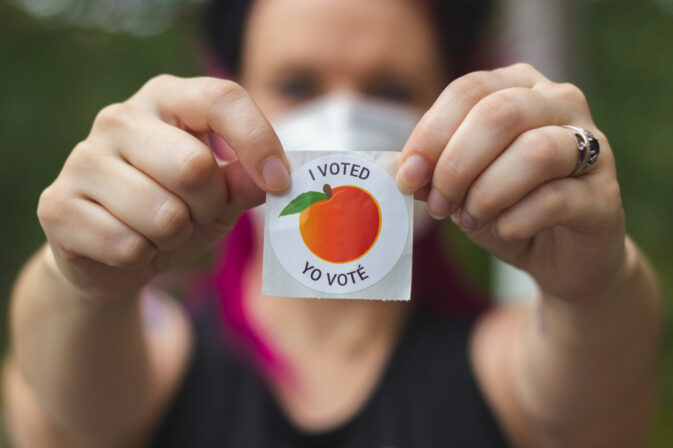Ortiz & Fleming: Top 10 Democrat Lies About Georgia’s Election Reform

Democrats led by President Biden and Stacey Abrams have relentlessly promoted the Big Lie that Georgia’s recently-passed election reform law (SB 202) is restrictive and racist.
President Biden called the law “un-American,” “sick,” “an atrocity,” and “Jim Crow in the 21st century.” He said the law “makes Jim Crow look like Jim Eagle” and claims the law’s ID requirement “adds rigid restrictions… that will effectively deny the right to vote to countless voters.” Stacey Abrams, a Georgia activist and likely 2022 Democratic gubernatorial candidate, calls the law “racist” and “Jim Crow in a suit and tie.”
As a result of these lies, ordinary Georgians continue to face significant consequences. Major League Baseball’s decision to move the 2021 All-Star game from Atlanta to Colorado due to the voting law is projected to cost small businesses, many of the minority-owned, roughly $100 million. Countless other smaller conventions that don’t make it into the news have likely followed suit, depriving local economies even further. Activists are using the lies about the law to try to defeat similar voting integrity reforms across the country, including Texas. Georgia state legislators such as State Sen. John Albers and Barry himself have lost work because of activist campaigns targeting their employers and clients.
That’s why advocates for small business, democracy, and integrity must continue to highlight Democrats’ self-serving lies about this election reform. We must set the record straight that Georgia’s law makes it easy to vote and hard to cheat. If we don’t fight back against these lies now, activists will have carte blanche to follow a similar playbook in the future.
Below are the top ten Democrat lies about Georgia’s voting reform:
- Lie: The law ends voting at 5 pm.
Fact: The law requires early voting hours to be open from at least 9 am to 5 pm, codifying the “normal business hours” requirement in the previous law. Counties can and do extend those hours from 7 am to 7 pm. - Lie: The law prevents voters from accessing water in poll lines.
Fact: The law allows voters to access water at polling places, including from poll workers. It bans political activists from using water as an excuse to violate existing laws on electioneering and bribery in polling places. - Lie: The law’s voter ID requirement is racist.
Fact: The law replaces the faulty and subjective signature matching system for absentee ballots with an ID number such as a driver’s license number, Social Security number, or free state voter ID number. The approximately 9,000 Georgia voters who don’t have one of these identifications can use a bank statement, utility bill, or alternative ID. - Lie: The law restricts early voting.
Fact: The law expands early voting with no-excuse absentee ballot voting and 19 days of early voting, with two mandatory Saturdays and two optional Sundays. - Lie: The law restricts mail-in voting.
Fact: The law sets a commonsense deadline of 11 days before Election Day for voters to request absentee ballots to ensure they have enough time to cast their ballots on time. The 67-day window to request no-excuse absentee ballots remains. - Lie: The law restricts absentee dropboxes.
Fact: The law mandates absentee dropboxes, used in an emergency situation in 2020, in all future elections. While 35 counties did not have dropboxes in 2020, the law requires all Georgia’s 159 counties to have at least one dropbox, and they can add an additional one per 100,000 of population. - Lie: The law allows “takeovers” of local elections.
Fact: Neither the state election board nor the legislature can overturn an election. The law allows the board to replace local election officials for evident mismanagement after in-depth reviews and appeals. - Lie: The law is controversial and makes Georgia a national outlier.
Fact: The law makes Georgia one of the best states in terms of voter access in the nation. A new report from the nonpartisan Center for Election Innovation and Research (CEIR) ranks Georgia’s election access in the country’s top tier. President Biden’s home state of Delaware, by contrast, requires voters to provide an excuse to access an absentee ballot. - Lie: The law is unpopular.
Fact: Polls show that the law’s provisions are popular with Georgia voters. For instance, a University of Georgia poll finds that two-thirds of Georgians support the law’s voter ID requirement. - Lie: Colorado’s election laws offer voters far more access than Georgia’s.
Fact: In many ways, Colorado’s election laws are more restrictive than Georgia’s. For instance, Georgia has more days of in-person early voting. And Colorado can require voters to provide a photocopy of their identification when they return their mail ballot for the first time.





